A fragrant symbol of royalty, love, hate and…scorpions?
Ocimum Basilicum has been around for over 5,000 years. The world of basil is vast but nuanced, encompassing over 60 different varieties each with a unique flavor and visual profile. It is a culinary staple in Italian, Thai and Indian cuisines. Medicinally, its uses range from treating skin ailments to diabetes (just be sure to check with your doctor or holistic specialist first!) Truly, its most fascinating characteristic is its expansive spiritual history. This herb really runs the gamut of the devotional world.
First, the herb in your kitchen

Though a few sprigs of basil may not be enough to supplement your daily nutritional needs, it is a zesty and dynamic addition to any dish; rich in vitamins A, C, and K, flavonoids and lots of antioxidants. It’s delicious fresh, dried, chopped, or crisped but did you know you can slap it? Slapping a leaf between your palms releases the aromatics.
Ever seen a bartender smack your fancy cocktail garnish? Now you know it wasn’t personal.
It is a tender annual which means it does best in long growing seasons or in containers you can keep indoors. Pruning your basil plant regularly encourages high production of its peppery leaves. But don’t fret if your plant does go to flower; those are edible too! Plus, your pollinators will thank you.
Basil leaves are sometimes used to soothe skin afflictions; like the sting of a bug bite. The herbs oils have both anti-inflammatory and antibacterial properties that are most potent when first picked.
A few pruning tips:
-
Trim from the top. The biggest leaves may seem tempting but they are big for a reason - they absorb the most sunlight, collecting and converting high amounts of nutrients for the entire plant.
-
For every leaf you prune, you allow room for 2 more to grow in its place. Look for the tiny sets of leaves below your top leaves. Cut right above these baby buds and soon, new branches will emerge.
-
Fertilize! Basil is vigorous - replenish your soil often and you’ll grow a healthy, productive plant.

Once harvested, there are a few ways to prolong the life of your basil leaves. Store them like you would cut flowers - stems in a glass of clean water. If you clipped without stems, place your leaves on a dish cloth or paper towel, gently roll them up and store them in a plastic bag. Both methods do best if placed in the refrigerator.
Basil can be added to so many dishes! Just be sure to only add in the last minute of cooking; it'll lose it's flavor quickly once exposed to heat.
If you're looking for something more than a margarita pizza, try crisping your basil:
- Preheat the oven to 350 degrees.
- Place clean basil leaves in a single layer over parchment paper and a sheet pan.
- Drizzle very lightly with olive oil and salt and pepper.
- Bake for 3-5 minutes but keep an eye on them! The smaller leaves will crisp faster.
Basil beyond the backyard:
A Godly herb, basil is closely associated with spiritual worship across many different cultures. It’s been regarded as a symbol of chastity, a safeguard in the passage of life, a declaration of love, a protection from evil, a token to ward off the devil and it often grows in the presence of either great heroism or great hate. It all depends on who’s asking.
Tulsi basil is the Holy basil of Hinduism. Though related to Ocimum Basilicum, Tulsi Basil has a few notable differences: the stem is hairy and the leaves have ridged edges unlike the smoothness you find in sweet basil. Tulsi was named in honor of the Goddess Tulasi and it is often found growing in places of worship; prominently displayed and carefully kept.
Medieval legend says basil grew wherever the blood of Jesus had fallen. Egyptians relied on basil for embalming purposes. In India, it was buried with the dead to ensure safe passage from one realm to the next. The Portuguese gifted basil to those they loved the most and the rumor is, if your suitor showed up on your doorstep without it, well, he may not be as devoted as you had hoped.
The Ancient Greeks had a slightly different take: they believed basil only flourished in hate - cussing while planting to make sure the herb felt appropriately abused. So don’t worry if gardening sometimes makes you swear, you're simply helping your basil plant thrive!
About those arthropods…
Scorpions and basil have been linked several times throughout history. African legends say the plant keeps those scary insects away but there were others who believed placing a basil leaf between stones would conjure a scorpion in two days' time. No thank you!
For much of Europe, more basil meant more scorpions! Enter Nicholas Culpepper - an herbalist for the masses, Culpepper spent years translating Latin to catalog medicinal herbs and their origins.

He declared smelling too much basil could ‘turn your brain into a breeding ground for scorpions of the mind’ and many believed basil could birth the bug directly as a result. He viewed it as a poison due to its ability to draw the venom out of wounds.
For the herbalist, the logic was simple: ‘like draws like’ and keeping in tune with its associations of impurity, it was basil itself that encouraged evil (or venom) to come out.
The etymology of the word basil is a bit mixed as well: with both royal and viperous connotations. The Greek root basileus means ‘King’ but basil was often seen as the poor mans herb in Ancient Greece. Basilisk, of Greek mythology, was a small, venomous serpent with a crown shaped mark upon its head - similar to a scorpion wouldn't you say?
Whatever its true origins, we’re grateful basil has triumphed on its path to redemption and is now an everyday household herb. It’s rich in flavor and meaning, tender yet robust, easy to grow, simple to care for and quite tasty to boot. Keep a swear jar near by and it could be profitable too!
Something we do know for sure? If basil can conjure scorpions, swearing will soon follow. 🦂
Sources: Basil - An Herb Society of America Guide, History of Basil - The Spruce Eats, Etymology of Basil - Bon Appetit, Nicholas Culpepper - Kew: The Royal Botanical Gardens


I am Italian so I grew up on it and love the fragrance as well as the taste.
Had something very interesting happened with basil this year. Since I no longer plant a big garden I do keep basil in pots on my deck. Last year in clipping the flowers off the top of the plant I just dropped in other pots on the deck. Could not believe I found 14 basil plants started in those pots. Just transferred some to larger pots of their own. Lets-hope that works out as I use basil almost every night with tomatoes and mozzarella cheese.
I’m growing basil for the first time. This article was very interesting. I knew nothing about it before. Thanks so much.
Very interesting.
I am not sure I like basil—sometimes it tastes good, other times not so good, but the nutritional value is outstanding and it gets me to eat more vegetables, so I’m working it into my diet. I knew there were about 10 varieties, maybe 15 if you pushed it, but SIXTY? Wow! I want to get the little round bush basil,orange basil and lemon basil. I live in an apartment and my patio is almost entirely shaded, so I’m glad to hear indoor planting is okay for them, and I love lemon and orange. Making freezer bags of basil sounds ideal for soups I heat and while they’re fresh they’ll go great in salads, I think. The thing is I’m a farm girl and I am crazy about herbs and their nutritional value and the way they change the taste of things drastically. I thought I hated navy beans until I put savory, onions and celery into them. Now I love them. There are so many herbs out there I haven’t tried, and my diet is so limited (food allergies and the need to get rid of weight), that finding natural, zero calorie taste changers is becoming more and more important to keeping my food interesting and tasty. Yes, I can get many spices from the grocery store, and they are easy to use. But there are spices that are just about impossible to find unless you go to a Japanese, Arab, Korean, Mexican, or other specialty store to find a particular spice, and sometimes even then they don’t carry it. You have to grow it from seed. Now that’s a real challenge, even for a farm girl, when she lives in a small apartment with no outside sunny space! And I’m in my older years, so carrying water would be limited and there are no outside faucets. Bummer! But I still want to try, so as soon as I can make up my mind and narrow the list to a doable, affordable number, I’ll be placing an order, including basil!